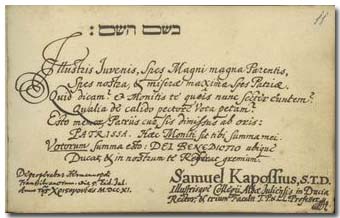
 * *
Illustris Juvenis, Spes Magni magna
Parentis,
Spes nostra, & miserae maxima Spes Patriae.
Quid dicam? ex Monitis te queîs nunc secter euntem?
Qualia de calido pectore Vota petam?
Esto memor, Patriis cur sis dimissus ab oris:
PATRISSA. Haec Moniti sit tibi summa mei.
Votorum summa esto: DEI BENEDICTIO ubique
Ducat, & in nostrum te Referat gremium.
Deproperabar Hermannopoli
Transsilvanorum. die 5. ei[us]d[em] Jul[ii]

Samuel Kapossius, S.T.D.
Illustrisque Collegii Albae Juliensis in Dacia
Rector, & trium Facultt. T. P. & L. L. Professor MP.
|
* Beshem hashem. Literally: “In
the name of the Name”. Rabbinic literature traditionally
substitutes with the term “the Name”
the unspeakable Godname, the tetragrammaton (YHWH – Jahveh).
|
|
|
In the Name of the Lord. *Illustrious
young man, a great hope of his great father, / and the greatest
hope of us and of our miserable fatherland, / What should I tell
you? which advice should I give you now when you set out? / What
should my ardent bosom wish for you? / Remember why you set off
from your fatherland: / and COME HOME. This is my supreme advice.
/ And my supreme wish is that may the BLESSING OF GOD lead you to
everywhere / and finally bring back to us.
I have improvised it in Nagyszeben of
Transylvania, in the same month of July 5, in the 1711th year of
the birth of Christ.
Sámuel Kaposi, doctor of
theology,
Rector of the College of the Transylvanian Gyulafehérvár, and
professor of the three faculties of theology, philosophy and
languages
|
p. 11. Nagyszeben/Sibiu, July 5, 1711
Kaposi Juhász, Sámuel
(1660-1713), Transylvanian Reformed
professor and orientalist
Sámuel Kaposi
Juhász (Sámuel Kapusi) was born in 1660 in Rimaszombat (Rimavská
Sobota), a son of the minister János Kaposi Juhász. After his
studies he became the rector of the local school, but in the same
year he set out abroad. In 1683 and in 1686 he was immatriculated
to the university of Utrecht, while on March 9, 1684 to that of
Leiden. During his Utrecht study years he was a corrector,
together with János Csécsi, Sen. of the Hungarian Protestant Bible
published in Amsterdam by the printer Miklós Misztótfalusi Kis,
and he also supported Misztótfalusi in later years. He also
visited other universities, both in Germany and England. In Leiden
He was granted the degree of ThD sine disputatione. In 1688
he came home, and in 1689 he went to teach in Gyulafehérvár (Alba
Iulia), to where the Reformed College of Sárospatak was fled to
safeguard. He taught philosophy as well as Latin, Greek, English
and Oriental languages. He achieved much for the spiritual and
material development of the college. He was respected also by the
representatives of other confessions. He was said to remember
texts once read, what is more even the exact page numbers, even
after many years. He died on July 23, 1713 in Gyulafehérvár; he
was said to have been poisoned.
He wrote several laudatory poems to his friends and
fellow students, for example to some works of Ferenc Pápai Páriz,
Sen. (1696, 1708), or a five-languages one – in Hungarian, Latin,
Greek, Hebrew and Syriac – to Miklós Apáti (1686-88). Amongst his
manuscripts we find a Commentary to the Catechism of
Heidelberg, an Introductio theologico-historica and a
number of other works. Amongst the printed ones are: Dissertatio de desertione spirituali.
Utrecht, 1683. – Memoriale hebraicum, exhibens lexici Hebraici
compendium metricum … Kolozsvár, 1698 (the first Hebrew
print in Hungary); 2nd edition: Utrecht, 1738. –
Breviarium biblicum, sive quatuor priora capita Geneseos Hebraice
edita. Kolozsvár, 1699. – Gamelion melographicum …
Kolozsvár, 1702.
The young Ferenc Pápai Páriz gave his Album in the
summer of 1711, shortly before his leaving the country, to the
close friend of his father, Sámuel Kaposi Juhász, Rector of
Gyulafehérvár, who at that time was in Nagyszeben. The term “in
the same month of July” probably refers to the note of Bishop
István Veszprémi, dated on July 1, 1711 (p. 5).
The son of the above mentioned János Csécsi also noted in the
Album in Halle in 1712 (p. 352.).
•
AlbLeid 673 • Jöcher-Adelung • MÉL • Pallas • Szinnyei • ÚMÉL •
ÚMIL • Weszprémi III 302 • Zoványi-Ladányi |

